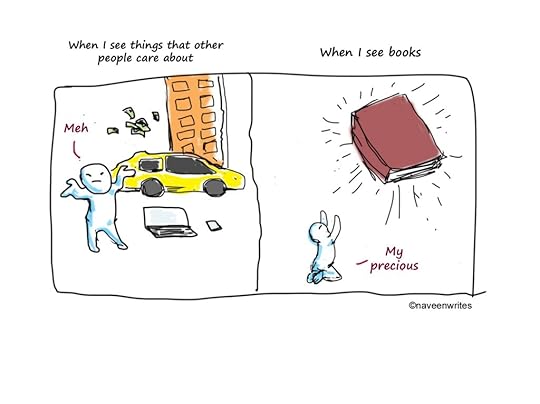Naveen Durgaraju's Blog, page 7
January 25, 2018
The book that changed my life.
There are a lot of books that we read over the course of our life that shape us, mold us and unconsciously make us what we are. In a way, all these books are life-changing. But if I have to talk about one book that had obvious effects on my life then it has to be -
Watchmen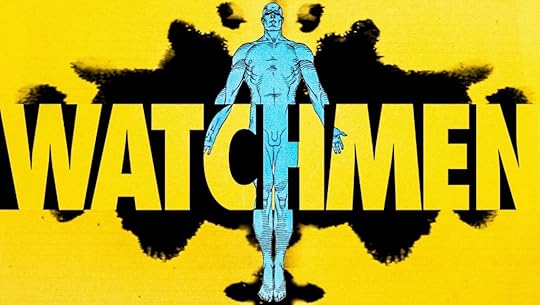
I grew up reading comics and the superhero genre has always been a favorite of mine. I had heard of Watchmen often in the comic reading circles but it was always fringe, controversial or too artsy. I wasn’t ready for the book yet.
Then one day I decided I am going to read it and that was when my life changed.
It changed the way I viewed storytellingWith it’s then groundbreaking portrayal of flawed superheroes and its unconventional yet brilliant use of the comic medium, Watchmen has showed me that storytelling is an art form that is only bound by imaginary rules and if you hone your craft enough and know what works and what doesn’t, you can tell your story however you want to and still leave a tremendous impact on your readers.
It changed the way I viewed the worldThey often said that comics came of age with Watchmen. This is because reading Watchmen also fundamentally changes how the readers view the world. It opened hitherto unknown doors of thought and gave me a fresh lens through which to look at the world. It made me realize through its various characters and their view points that nothing is ever as simple as we think it is, the world is a complex place and every view point has its own merits and demerits. I found myself agreeing and disagreeing with each of the characters only to finally realize that no one is completely right or wrong and our worldview needs to constantly be in flux to understand the complex web of emotions and actions around us.
It gave me something to look up to.The book as it blew my mind also gave me an irresistible urge to create something — to create something equally profound and layered. It will always remain the work whose level of quality I aspire to one day achieve in my own work. It made me want to create something like it and that has always been the mark of a good piece of art for me.
It made me a writerI always wanted to write but it was Watchmen that gave me the final push and necessary motivation to actually start writing books. The creative urge that it kindled will always remain the core reason why I started writing my first novel and still remains a major influence on my second book. So yes, this is the single most visibly obvious ways in which this book has affected my life. Watchmen made me a writer.
This was originally an answer on Quora
My new book, a post apocalyptic thriller set in India-> Sinners: The dawn of kalki

January 13, 2018
How to write a timeless literary masterpiece

Timeless literary pieces are timeless because they speak to our inherent nature, answer eternal questions or raise questions that we had always asked in different ways. They speak about what is fundamentally relevant to society and people, no matter how much the world around us changes.
The tricky thing is no one can predict what becomes a timeless classic when the work is still in progress.
Writing a timeless classic is like trying to create viral content in current times.
You can try to maximize the chances but you can never be certain what becomes the work that will remembered for generations and what is forgotten in no time.
Here are some pointers to maximize the chances.
Write about human nature:Human nature is a vast pool to explore with myriad little quirks. Timeless pieces always tap into what makes us human and deal with themes that are universally recognizable like love, hate, ambition, jealousy and passion etc.
Create complex characters:Make your characters realistic with complex arcs and solid motivations. Any timeless work needs to have characters that the readers empathize with and have strong reactions to. They should love them, hate them and more importantly feel like these characters are real people with real traits.
Say only what you can say:With your work, always try to bring in, what only you as an individual can bring to the table. Say what you have to say without filters and inhibitions. If you want to write a timeless piece, fear of failure and fear of judgement are not options.
Be relevant:Most of the works which stay immortal in the collective consciousness of readers are books which deal with themes relevant to us and society irrespective of the times and the status in which the reader lives. Make sure your work comments on the nature of things which will always be important like society, freedom, government, choice, politics and humanity etc. Your work, in order to survive the tides of time, should echo the sentiments, hopes, desires, trials and tribulations of generations and individuals irrespective of the background in which they live.
This originally appeared on Quora
My new book, a post apocalyptic tale set in India with a mythological premise — Sinners: The Dawn of Kalki

January 9, 2018
Want to write a kick-ass novel based on mythology? Do these things.
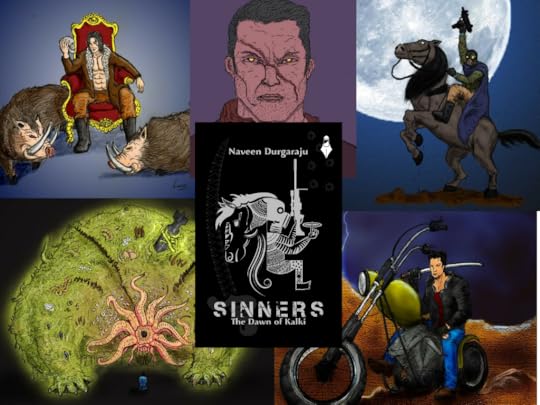 Characters from ‘Sinners’
Characters from ‘Sinners’Recently I have been to the World Book fair 2018 at New Delhi to talk about my new book and how to write mytho-fiction.
Below is a summary of what I have talked about, for the benefit of other writers who are interested in writing mytho-fiction in the Indian literary market.
1) Rethink the GenreThe first things that come to mind when we think of mytho-fiction are re-imaginings and re-tellings - the same stories in a different language, a different setting or a different era, in a different sense of realism etc.
For example, the Amish school takes older epics and gives them a historical fiction vibe, rooting them in reality. Ashok Banker tells Ramayana as it is, just in better writing. But we need to understand that mytho-fiction doesn’t just have to be re-tellings and re-imaginings. We can tell new and original stories based on these stories, these settings and these characters. We can take these concepts and make them our own by telling entirely new and engaging stories that interact with these concepts. We can either use these tropes, subvert them , turn them on their head or play with them.
Don’t be chained by what has come before. These stories and settings should be a platform to say new and interesting things. Everyone who first hears of my first novel Vajra, immediately concludes that it’s a retelling of the myth of Indra but it is not. It’s a sci-fi novel which also explores the themes from the story of Indra. My new book, which is part one of a trilogy called ‘Sinners’ takes its premise from the myth of Kalki but immediately veers off into telling a character driven story set in post-apocalyptic India. The myth of kalki is an interesting vehicle to tell this unique story. This is not the story of Kalki. This is the story of people who have to deal with a grounded and dark world in which the myth of kalki becomes reality.
So don’t be confined by what you think the genre has to offer. Do not be cornered by what currently is selling or what the current authors are doing. There is a lot to explore. Be original and be bold. Tell the story that only you can tell.
2) Skip the lecturesOne of the biggest pitfalls of mythological fiction is the flawed exposition — long walls of text in which a character explains all the information that the author has accumulated over his/her research — a lecture on the mythological and spiritual leanings of the author. Avoid this as much as possible.
Not only is this patronizing, but also inherently uninteresting and takes a reader right out of the book. In real world, there are no random monologues dished out by people to move the plot forward. Always think if a dialogue is plausible in real world. This is something some of the best writers always take care of. If you observe good writers like George RR Martin or great film writers like Quentin Tarantino, it’s their dialogues and how they flow that make their writing superior and fresh. Do not lecture your readers. Entertain them. If they want huge info dumps they would be reading non-fiction and not fiction.
3) Plot still mattersJust because you have a good idea or a good mythological source to explore, doesn’t mean you do not care about the actual plot. You are still telling a story and it is your duty to tell the story with a tight plot without holes and with the right pacing, right motivations, dramatic conflict and right payoffs.
You are taking your readers on a journey. You are still the chief navigator and pilot of this journey. Just because you are telling a story based on a source doesn’t mean it will run on auto-pilot. Always care about how you would perceive the story as a reader. Do not become a sellout and compromise on the core themes and what you actually wanted to tell with the story but at the same time remember that you are telling the story to someone and be empathetic about your reader.
4) Trust your readersNever underestimate the intelligence of your readers. Never doubt or insult your reader’s capability to comprehend your story. Do not dumb down your ideas or story just because you think the audience won’t get it. Never assume that readers don’t want complex stories, don’t want unconventional stories or don’t want intelligent and unique stories.
We have enough authors doing that already. The current crop of books are carefully tailored products pandering to the lowest common denominations among the reading community. Current Indian literature has grown a lot in terms of quantity but at the expense of quality. We always had a great literate history with brilliant literature and poetry. The current state is stagnant, stale and unoriginal compared to our earlier endeavors.
Do not contribute to this vicious cycle of producing mediocrity which would in turn fuel the illusion of demand for mediocrity since readers consume it for the lack of options and which in turn sponsors more mediocrity and ultimately similar mediocrity is created. Never doubt your reader’s ability or taste. Write your best and refuse to dumb it down to pander to anyone.
5) Make your characters realAs much as mythology is about the fantastic and the divine, it is also about the human heart, human traits, flaws, choices and failings. Do not make your characters uni-dimensional, cardboard cutouts without any personality, growth or trials.
Just because you are writing about Gods or mythical beasts, doesn’t mean they are not complex characters. Always remember that your characters need to change during the course of the story. They might grow or fall, live or die. But make sure they are not stagnant. What arcs are you giving your characters? How do their actions and the actions of those around them affect their psyche and their decisions? How does the story change their world view? Make sure your characters behave like real people and not like vehicles for the plot to go from point A to point B.
Any mythological story is ultimately about how the ordinary interacts with the extra-ordinary. If you do not get the ordinary right, the extra-ordinary will only remain a superficial gimmick.
6) Have consequencesThis is a key factor that makes or breaks a story. Often in mythological settings, the characters are really powerful. Because of this, authors often make the mistake of making the world and the actions of those in it have no consequences on the overall plot or the main characters. This is bad storytelling.
A good story and a properly realized world should always have consequences. Your protagonist and his band don’t just march into danger or perform heroic world changing deeds without facing any consequences. Everything that happens should alter the world, the setting, the current status quo and the characters in one way or the other.
The action in your story should be fantastic in its execution while very grounded in its aftermath. This is how mythological fiction also becomes good fiction. Without consequences, the story remains a shallow work that doesn’t really say anything. Without consequences, the readers stop caring about the characters or the fate of the world that they inhabit.
These are 6 key ideas to remember when writing a fast paced, action packed mytho-fiction.
My new book — Sinners: The dawn of Kalki

January 2, 2018
November 4, 2017
How to market your new book
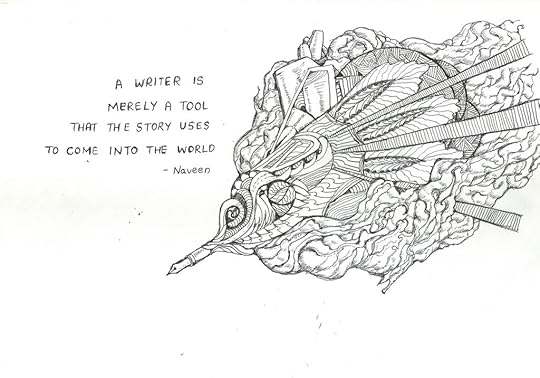 One of my writing doodles.You do not market your book.
One of my writing doodles.You do not market your book.Most people think once the book is out you can market it to the readers and they will lap it up.
Wrong. People don’t care about the products. They care about identity and experience. Long before the book even comes out you need to identify your target audience and make effort to create a platform and identity that they would be willing to embrace. Your book is only an extension of this identify that should benefit from all the attention that the identity already gathers
The importance of attention.
I am going to address this from the perspective of an author who does not have a huge marketing budget and entire media marketing tools at his disposal.
You might write the best book in the world. But if readers do not know it exists, it won’t sell. And how will people know that your book exists? Before you give them this information, they should first have your attention. Attention is the only currency on which marketing works. The more of it you have, the more successful you will be.
Getting the attention.
To receive anything, you first need to provide something. In this world of continuous distractions, if you are not providing value, you are obsolete. You need to either entertain or educate those from whom you seek attention. So if it’s readers you are looking to attract, create and distribute content that would benefit the readers. I draw and post bookish wallpapers and doodles on Instagram for the same.
https://medium.com/media/b3c8feee8dc5f6d3fd19db5a4c04f34a/hrefhttps://medium.com/media/5e3f86ad75a4283a16cc161a6ab0b45a/hrefYou should create content that benefits readers. Write articles that helps readers and celebrates reading.
Examples:
6 reasons why readers have more fulfilling lives — Naveen Durgaraju — Medium
The guide to getting your first book published in India
How to start your novel — Naveen Durgaraju — Medium
I want to provide as much value as possible because I am genuinely interested in building a community of readers and writers.
The mindset of marketing:
Instead of giving you very narrow advice on how you should market the book, I am going to give a broader idea of how you should go about it.
Across all the different platforms, you need to follow these 3 simple steps -
Identify where the attention isAnalyze what value you can provide to your target audienceProvide and distribute this value in the zone of attention that you have identified in step 1.That’s all. If it’s Instagram, you follow relevant hashtags like #bookstagram and see what people are reading/writing and be a part of the conversation. You also use the same hashtags on your post.
If it’s Facebook, you see where most of your target audience are going, which groups they are part of and then offer genuine value in those groups.
The actual book:
Finally we come to the actual book once it comes out. This is where I merge all my existing talents to create posts that would create intrigue and interest in my target audience. I draw and color character art and other posts that are relevant. How to create good content is again too vast a subject and will take an elaborate answer in itself to get into even the superficial details. Instead here are some examples.
https://medium.com/media/1eb14b35bec637261314ad151ed84be0/hrefhttps://medium.com/media/2392594be6c4e77fcd81903abc21a48e/hrefhttps://medium.com/media/8eafdc05b34366fcef71890fbdf815c9/hrefhttps://medium.com/media/309f83224f024c499a26d624bbfbaabd/hrefhttps://medium.com/media/276a0f2ccd006db9469e44124eeae7b5/hrefPaid marketing:
Apart from all this organic growth you can leverage Instagram and Facebook’s paid advertising to reach out to more people who are likely to appreciate and engage with your content. How to do paid marketing is a whole different story and a whole different post.
Engage with your audience
Make sure that you engage with your audience and be open to feedback. Take both good and bad reviews in stride. The relationships you build your readers are far more valuable then mere sales in the long run.
I would be documenting my journey of trying to build this community and trying to get the readers of this country read my trilogy.(which started off as a Quora asnwer and then grew because Quorans wanted it to — engagement as I said). Feel free to join me in this journey.
My new book -> Buy Sinners — The Dawn of Kalki Book Online at Low Prices in India
Created a topic for the book in Quora — Sinners: The Dawn of Kalki . Feel free to ask me any questions regarding the same.

November 1, 2017
The guide to getting your first book published in India
The traditional publishing industry sometimes works like a maze. Years worth of effort and anticipation enters it everyday in staggering proportions but only empty responses and frustrating silence usually emerges out of it. So here’s a guide to traverse this maze.
Finish itNo matter what kind of book it is, if this is this is your first book, then the first and foremost thing you need to do is finish it. Do not ever assume that you would land a publishing deal or agent contract first and then you would complete the book. Unless you are a star writer and there are people clamoring for your work to come out, this is not how it usually works.Decide on your plan of attack.
There are 3 ways you can go about getting your book published. You can go for
1) Self publishing where you publish the book using services like KDP
2) Partnership publishing where you would be partnering with the publisher by contributing money to share the cost of publishing
3) Traditional publishing which is what most people usually look for.
In traditional publishing again you can take two routes.
a) directly approach publishers or
b) you can get a literary agent who would represent you and would get in touch with publishers in order to get you a good deal that your work deserves.
Now, most publishers usually do not accept unsolicited submissions and even if they do, they are not likely to go through all the submitted entries. Most of them rely on trusted agents to pitch them good work, out of which they would pick the ones that makes the most business sense to them.
The publishing landscape in India is growing more crowded each day and publishers are slowly starting to rely more on agents than on direct submissions. But there are still quite a few publishers who consider direct submissions. So think carefully on what route you want to take based on your own timelines and your target publishers.Write a query letter
Once your work is finished and you have pulled enough hair over it, trying to edit it to the best of your abilities, you sit down and write a query letter. Here is a good reference of what a query letter is and how to write one. Basically, it is your sales pitch to publishers/agents in order to convince them that their time/effort/money is not completely wasted if they invest in your work.Read submission guidelines
Each publisher/agent has their own submission guidelines. Visit their websites and read them carefully. Tweak your query letters accordingly. Try to send your query letters to as many publishers/agents as possible unless you are looking for some very specific agent/publisher. Some of them might ask for the first 3 chapters along with the query letter. This is why it is always better to be prepared with your entire manuscript polished and ready before sending out the query letters.Send Sample chapters.
Once you send out your query letters, if the receiving party is interested in your work, they would usually ask for sample chapters (unless they ask for it along with query letter). One important thing to note here is most publishers/agents take a long time to reply to submissions, even if they are interested. So waiting for around 3 months is usually the norm. Do not lose heart immediately if you do not get a response. At the same time, keep sending out letters to other publishers/agents. Once they have expressed interest in your work and asked you for sample chapters, send out the chapters according to what has been asked. Some might ask for first 3 chapters and others for any 3 chapters. If they ask for any 3 chapters, try to send out your best 3 chapters. Always keep in mind the fact that these chapters are supposed to convince the publisher/agent to take up your work. That means these chapters should have content that the publisher thinks would appeal to the readers. Chapters which you think are well written but would have no impact on a publisher/reader are not recommended.Send full manuscript
Once the publisher/agent goes through your sample chapters and finds them suitable for what they are looking for, they would ask for the final manuscript. This request might come as early as 2 days from your day of submission of query letter or as late as 6 months from that day. Always have your full manuscript ready and properly formatted based on the publisher’s guidelines. Send it out with all the necessary details of how you actually envisioned it. Do not send out unfinished work or rough drafts.Sign the contract
If the publisher/agent goes through your entire manuscript and feels it is what they are looking for, they’ll offer you a contract which outlines details like how much royalty the author will be receiving and how much duration the publisher would be having the publishing rights for etc. Read the entire contract carefully before signing it. Make sure all your demands are met and you are clear on what is being agreed upon between you and the publisher. Do not hurry. You have waited long enough to get to this stage. Now is not the moment to hurry and overlook things.
Once you are satisfied with everything that’s written in there, sign your contract and send it back to your publisher. You have now officially got your first book published.
There it is. Simple 7 steps to get your first book published.
My second book ‘Sinners: The Dawn of Kalki’ is now traditionally published and is available on Amazon

October 31, 2017
Words are my source of wonder.
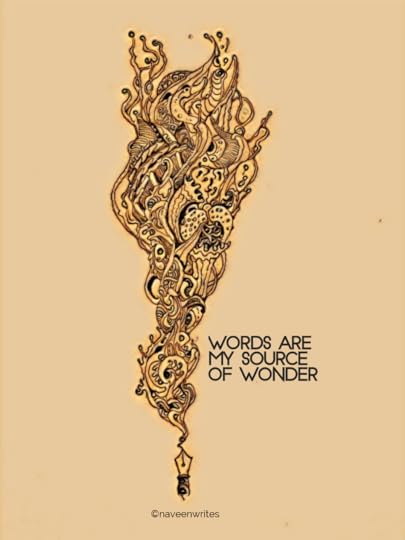 Follow me on instagram @naveenwrites for more writing and reading related content.
Follow me on instagram @naveenwrites for more writing and reading related content.
October 25, 2017
Book review: Sapiens by Yuval Noah Harari
 More book sketches @naveenwrites in fb and insta
More book sketches @naveenwrites in fb and instaSapiens by Yuval Noah Harari is a primer on the human existence and its progress right from its dawn to its current shaky supremacy.
Sapiens is a personal book. It is not a scholarly documentation of the entire history of humanity. It is is undoubtedly Harari’s own take and his own version of the events that transpired.It glosses through the different popular ideas in broad strokes on what happened and how, while allowing Harari’s own beliefs and biases to come to a conclusion as to which is the definitive and the most probable explanation.
Sapiens deals with major shifts through out history — natural, social, biological, economical and technological. It deals with the cognitive, agricultural and scientific revolutions while delving into numerous disciplines like anthropology and paleontology. It manages to give someone who is interested in the basic ideas a quick glance on how it all came together.
While I loved how intellectually stimulating and interesting the book is, I found certain sections to be repetitive while others to be easily dismissive of the ideas that do not agree with the author’s worldview. Some ideas are thoroughly explored while others are just glanced over and quickly cast aside. On the whole, the book is a philosophical and intellectual exercise contemplating the nature of the world than an accurate and detailed account of events, ideas and beliefs.
Having said all that, this book is an absolute treat to beginners and curious minds who want to know more about us and the world that surrounds us. As some one who is only vaguely acquainted with most of the ideas in the book, I simply loved it and was thoroughly gripped.
If you are already familiar with most of the ideas,beliefs and concepts surrounding the human condition and are looking for some deeper scholarly insight, may be this book will not contribute much to your search.
Recommended:
For anyone who is interested in humanity and the world.
Good:
Gripping read
Covers most ideas and idealogies
Gives a basic understanding of the world and a new way to look at it.
Bad:
Sweeping generalizations
Biased at times
Rating: 4/5 stars
My new book, ‘ Sinners: The Dawn of Kalki ’ is the first part in a post apocalyptic trilogy set in India.

October 24, 2017
Book review: Sphere
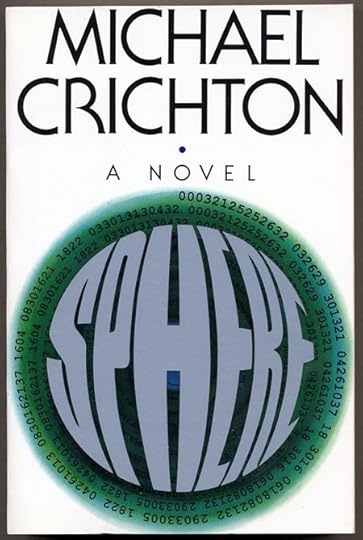
When I first read Jurassic park, it blew my mind. Since then I have been a fan of the author Michael Crichton. I liked how he takes a sci-fi premise and makes it about something more profound and human. I liked how Jurassic park dealt with themes like man playing God, power, nature and life finding a way. So after that, I was looking for something similar from him to both excite and intellectually stimulate me. I then picked Timeline which though is a great book doesn’t have a lot of commentary about the human condition and such. And this is where Sphere by Michael Crichton comes in.
Sphere is the book that I wanted to read, that I wanted to exist, that I wished someone had written.This is sort of my dream book.
A mysterious object is found deep below the oceans and team of diverse individuals are sent in to investigate and explore. What transpires next is something you would not expect from a story typical to this genre. Crichton immediately takes the story into a brave new original direction that keeps weaving in and out of the expected and unexpected.
I loved how it starts as a sic-fi mystery but slowly turns into a psychological drama and even psychological horror at times. This is what I expect from Crichton and with Sphere he delivers perfectly.
The pacing is perfect and gripping. The book doesn’t let up even for a moment and I couldn’t guess what would happen right till the last page. It stays true to its quirky and wonderfully weird roots right till the end.
The Book was adapted into a movie in 1988 by Barry Levinson which will make for an interesting watch for those who are fans of Crichton. Regardless of what you think about the movie, don’t let it stop you from picking up this book.
Crichton’s writing style may put off certain readers at times but there is no denying the genius of his ideas and his ability to seamlessly fuse different genres. Numerous adaptations of his books into other media will remain as testament to the potency of his ideas.
Recommended For :Sphere by Michael Crichton is recommended for fans of good sci-fi and original storytelling. Also to those who enjoy a good thriller.
My new book ‘ Sinners : The dawn of kalki ’ is a post apocalyptic trilogy set in India.

October 19, 2017
King in the north

A wallpaper I drew for my own mobile.
More variants lined up.


